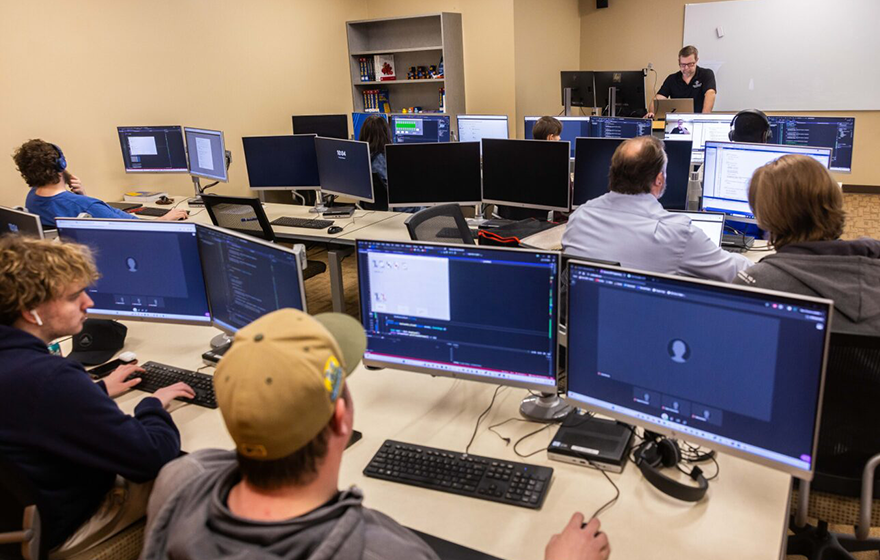The Advantages of a Dedicated Development Team in a Competitive Market
The Advantages of a Dedicated Development Team in a Competitive Market
Blog Article
Dedicated Developers vs. In-House Teams: Which Is Right for You?
The decision in between utilizing specialized developers and keeping an internal group is a significant one that can influence the trajectory of your tasks and total company strategy. On the other hand, in-house teams add to a natural firm culture and a nuanced understanding of lasting objectives.
Recognizing Dedicated Developers
The growing need for specialized skills in the technology sector has brought about the development of committed designers as a viable solution for lots of organizations. These specialists are usually gotten on a job basis, enabling business to utilize specific expertise without the lasting dedication linked with full-time hires. Committed programmers are frequently ingrained within a client's group, supplying adaptability and scalability to meet task requirements.
This version permits companies to access an international skill swimming pool, which is specifically useful in a rapidly evolving technical landscape. Dedicated programmers can be sourced from numerous geographical places, ensuring that firms can discover the right ability at affordable prices. They frequently bring a wealth of experience and understanding, having functioned on varied projects throughout various industries.
Furthermore, specialized developers can focus solely on the jobs available, boosting performance and effectiveness. They are geared up to incorporate effortlessly right into existing process, collaborating closely with in-house teams to attain task objectives. This technique not just minimizes the problem of employment and training yet also enables organizations to continue to be nimble, adapting quickly to changing market needs and technical improvements.
Benefits of In-House Teams

Furthermore, internal teams have a tendency to have a deeper understanding of the firm's objective, values, and objectives. This alignment can enhance staff member involvement and motivation, as staff member feel more attached to their job and the organization's success. Additionally, having a devoted in-house group permits much better placement of objectives and techniques, as these participants are regularly focused on the business's priorities.
Internal groups additionally assist in quicker decision-making procedures, as they can react more swiftly to obstacles and changes. The well established relationships and familiarity with company methods enable streamlined workflows and lowered miscommunication. Inevitably, the mix of a cohesive culture, alignment with organizational objectives, and effective interaction makes internal groups a beneficial possession for numerous companies, specifically those wanting to grow lasting growth and development.
Expense Factors To Consider
When examining expense factors to consider, both internal teams and dedicated programmers present unique financial ramifications for organizations. Involving dedicated developers generally involves a pay-per-project or per hour rate design, which can be affordable for services with fluctuating task demands. This technique enables for flexibility in scaling resources up or down, making certain that companies just pay for the services they require.
On the other hand, internal groups entail dealt with prices, including salaries, benefits, and overhead expenses such as office and tools. While this model uses better control and instant schedule of resources, it may cause greater long-term costs, especially if the workload does not warrant a full-time personnel.
Moreover, companies ought to consider the covert prices connected with recruitment and training of in-house employees, which can further stress budgets. In some cases, the moment and resources spent on managing an internal group can interfere with the organization's core organization objectives.

Job Management and Versatility
Job management and versatility are important variables that influence the selection between in-house groups and committed programmers. Dedicated teams usually have developed procedures for taking care of projects successfully, leveraging details approaches like Agile or Scrum, which help with iterative progression and adaptability.

Eventually, the choice between internal groups and devoted developers pivots on the wanted degree of flexibility and the details project management demands. Companies have to evaluate their functional characteristics, project intricacy, and source schedule to determine which alternative lines up ideal with their tactical objectives.
Making the Right Choice
Picking the right advancement method-- committed designers or in-house groups-- needs a mindful analysis of different aspects that align with a company's calculated goals. hire dedicated developers. First, think about the nature of the job. If it requires specialized abilities or a fast scale-up, dedicated developers might be better. Alternatively, in-house groups can give far better connection and assimilation with existing employees.
Next, assess your budget. Dedicated developers usually offer an affordable solution for short-term jobs, while internal groups may incur higher long-term expenses due to salaries, benefits, and overhead prices. Assess the level of control and partnership desired; internal groups generally promote stronger communication and positioning with business society.
If immediate outcomes are essential, dedicated designers can be onboarded rapidly, whereas developing an in-house team takes time for recruitment and training. If continuous advancement is crucial, investing in an in-house team may produce far better returns over time.
Verdict
Finally, the choice in between specialized programmers and internal groups depends upon project needs and business purposes. Committed programmers give versatility and customized knowledge, making them ideal for short-term efforts. pop over to this site Conversely, internal teams cultivate a natural culture and deeper alignment with long-lasting objectives. Cautious analysis of budget restrictions, project timelines, and wanted control degrees is necessary for establishing one of the most appropriate strategy, ensuring alignment with critical priorities and functional effectiveness.
The choice in between making use of devoted developers and maintaining an in-house group is a considerable one that can affect the trajectory of your tasks and general service approach.Job management and versatility are vital variables that affect the selection between dedicated programmers and internal teams. offshore software development.In contrast, in-house teams may stand out in preserving a constant job monitoring framework due to their knowledge with the organization's culture and long-lasting goals. Devoted designers usually offer an affordable solution for short-term tasks, while in-house groups may incur greater long-term expenditures due to incomes, advantages, and expenses prices.In conclusion, the choice between devoted programmers and in-house teams hinges on project needs and business purposes
Report this page